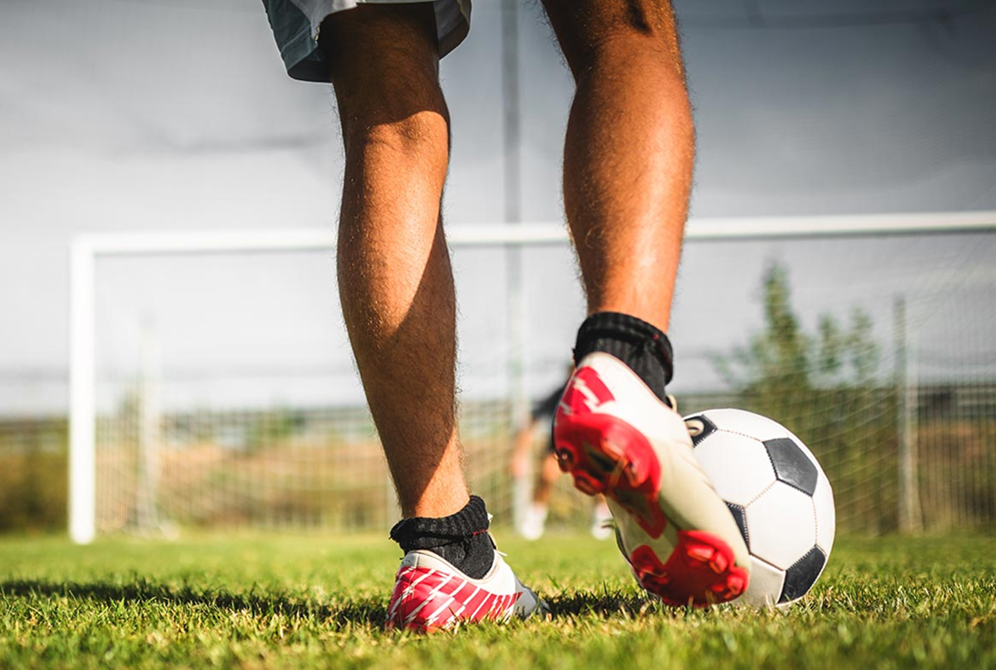
How Acupuncture Can Help Soothe Pregame Anxiety
May 7, 2024
The topic of mental health in sports has been mostly ignored until fairly recently. But thanks to several high-profile athletes’ willingness to open up about their struggles, the topic is no longer quite so taboo.
 “Athletes at all levels are realizing the importance of their overall mental health, mental preparation before an event and mental recovery afterward,” says Thomas R. Betts, DAOM, LAc, a sports medicine acupuncturist at Henry Ford Health. “Having your mind in the right place pays big dividends in terms of sports performance.”
“Athletes at all levels are realizing the importance of their overall mental health, mental preparation before an event and mental recovery afterward,” says Thomas R. Betts, DAOM, LAc, a sports medicine acupuncturist at Henry Ford Health. “Having your mind in the right place pays big dividends in terms of sports performance.”
One of the many tools athletes are using to get their minds healthy is acupuncture. It may be an ancient Chinese practice, but it can be useful to help improve the mental health of modern athletes.
What Is Acupuncture?
Acupuncture is a healing technique that has been used in traditional Chinese medicine for thousands of years. Acupuncture practitioners (acupuncturists) insert very fine, thin needles into the skin at various points on the body, depending on what condition they’re treating.
According to traditional Chinese medicine, the insertion points for the needles correspond to specific internal organs or energy channels in the body. “The philosophy behind traditional Chinese medicine is that acupuncture works by manipulating the flow of blood and energy to create balance and harmony in the body,” says Betts.
From a Western medicine perspective, acupuncture works by stimulating the central nervous system and by having some direct effect on the tissues in which needles are placed. Acupuncture also has a balancing effect on hormones within the body. It works well with other treatments for anxiety such as sports psychology, massage therapy, guided visualization and meditation.
How Can Acupuncture Improve Sports Performance?
Acupuncture has long been used to help people relax, reduce stress and cope with anxiety. And it can have that effect even when the acupuncturist is treating a physical problem. “Even when I’m treating an athlete for a sports injury, when I ask how they feel post treatment the overwhelming response I hear is ‘I feel so relaxed,’” says Betts.
This is why acupuncture seems like a natural fit for helping athletes of all levels cope with performance anxiety, pregame jitters or other competition-related fears. “Reducing stress helps athletes perform better,” says Betts. “And more and more athletes are realizing that taking care of their mental health and using tools to stay mentally focused can really enhance their performance.”
When Should Athletes Try Acupuncture?
Since an acupuncture session can leave you feeling super calm and relaxed, you don’t want to try it for the first time right before a game or competition. “The timing is important,” says Betts. “You want the athlete to feel motivated to compete, not totally Zenned out.”
The best approach is to schedule a series of acupuncture sessions in the weeks leading up to a big game, competition or race. Betts says he typically recommends athletes come in twice a week for three weeks to get started. “It’s not about treating their anxiety in the moments before a game,” he says. “It’s about establishing a baseline of calm that they can carry with them into the competition.”
While there’s still some stigma surrounding athletes and mental health, Betts sees the popularity of acupuncture as one sign of a shift. “I think we’re trending in the right direction for mental health,” he says. “Athletes are starting to understand that if they want longevity and success in their sport, they need to take care of their mental and emotional health—not just the physical.”
Reviewed by Thomas Betts, DOAM, RAc, a certified sports acupuncturist who sees patients at the Henry Ford Center for Athletic Medicine in Detroit.
To find a sports medicine provider at Henry Ford Health, visit henryford.com/athletes or call 313-651-1969.

Wake Up And Walk! 7 Benefits Of Taking A Morning Stroll
By
Nick Parkinson, M.Ed., AT, ATC, TSAC-F
Henry Ford Health
May 3, 2022
 Still having difficulty fitting exercise into your day? Start by heading out for a morning walk.
Still having difficulty fitting exercise into your day? Start by heading out for a morning walk.
No matter your fitness level, walking offers tremendous benefits, including improving your mood, managing your weight, increasing your energy and reducing your risk for disease. All you need is a good pair of walking shoes and a place to stroll.
7 Benefits Of A Morning Walk
Starting your day with a morning walk helps you check something important off your daily to-do list – your fitness.
Even if you only have time for a 10-minute walk each morning, you’ll have up to 70 minutes of exercise by the end of the week. And any type of movement that you add in later in the day, whether it’s taking the stairs or walking to your car at the far end of the parking lot, improves your overall health.
Morning walks offer many benefits, helping to:
Boost your inner athlete. Taking a morning walk boosts your stamina, flexibility and energy. As your fitness improves, you’ll be able to move through your daily activities more easily.
Improve your mood. Getting outside gives you a chance to enjoy fresh air and nature. Walking, like any form of exercise, reduces stress and anxiety. You’ll start the day with a positive attitude, better able to manage challenges during the day.
Increase your productivity. After a morning walk, you feel energized and ready to take on the day. Starting your day with physical activity improves your concentration and productivity.
Keep you standing tall. Many of us are sitting at work or school for several hours each day, often without watching our posture. Walking with your shoulders back and head held up improves posture. Walking also improves your core muscles, which help support your spine.
Manage your weight. After a full night’s sleep, walking helps jump-start your metabolism, allowing you to burn calories at a faster rate. Along with a healthy diet, walking can help manage weight.
Reduce your risk for disease. A regular walking routine can reduce your risk for diabetes, heart disease, hypertension (high blood pressure), obesity and some cancers.
Strengthen your bones. Our bodies are constantly making new bone and breaking down old bone. After age 50, we lose bone mass as our bodies break down old bone at a faster rate. Along with a healthy diet, weight-bearing exercise like walking strengthens your bones and reduces your risk for osteoporosis.
How To Start Your Morning Walk Routine
Keep these strategies in mind as you plan your morning stroll:
Eat a light snack before you walk. After sleeping all night, it’s helpful to eat a light snack or breakfast before heading out the door. Toast with almond butter or some yogurt with nuts and berries can give you the energy you need, especially if you’re planning a longer walk.
Check out different walking routes or events. On a busy morning, you may choose to walk close to home to save time. When your schedule permits, explore different neighborhoods, nature preserves or trails in your area. You may also want to check out local 5K races — many of these events welcome walkers.
Don’t forget to stretch. After walking, take a few minutes to stretch your leg muscles to work out any knots in your calves, hamstrings or thighs.
Increase impact with weights and intervals. As you build your stamina, boost the benefits of your walk by holding light weights or wearing a weighted vest. Try turning your walk into an interval training session by alternating between a fast and slow pace.
Prepare for the weather. To avoid falling on icy winter sidewalks, wear proper boots and spikes. Wear hats, scarves and gloves to protect your skin from frostbite. Wear a hat and sunscreen in the summer heat. Carry a water bottle to stay hydrated, especially on longer walks.
Schedule your morning walks. Add a morning walk to your calendar and keep the appointment. Over time, morning walks can become a habit you won’t want to give up.
Walk with a buddy. Find a walking partner who will hold you accountable for your commitment to exercise. To enjoy even more socializing as you walk, check out walking groups in your community.
To find a doctor at Henry Ford, visit henryford.com or call 1-800-436-7936.
Nick Parkinson, M.Ed., AT, ATC, TSAC-F Supervisor of Athletic Training with Henry Ford Sports Medicine, also leads Sports Performance training at the William Clay Ford Center for Athletic Medicine. He is a regular contributor to Henry Ford LiveWell. Learn more about Nick

